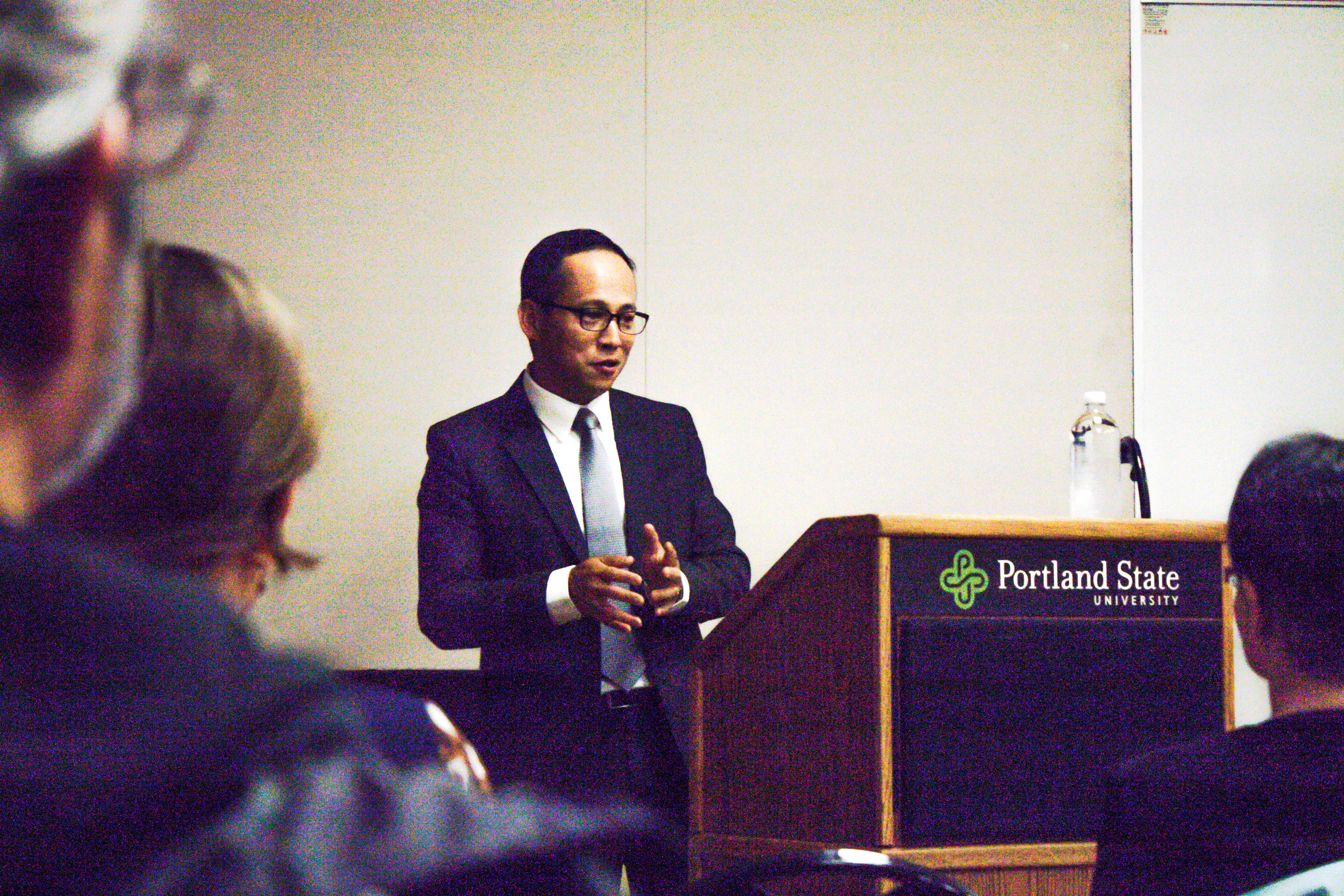The Portland State University Studies program hosted a talk given by one of its mentors, Mohanad Elshieky, on May 17 in Smith Memorial Student Union. The local comedian presented a serious lecture sprinkled with humor called “The Road From Libya” about living in Benghazi during the Libyan Revolution.
Freedom, just not of critical speech
At five years old, the Libyan government killed Elshieky’s neighbor and burned his house to the ground. He grew up knowing he couldn’t talk about that event or be critical of the government. Anyone could be a government informant and critics would disappear.
“It’s different because here [in the U.S.] people have suspicions about like, ‘Is the government taping our calls?’” Elshieky said. “But back home it was more like, ‘We are actually listening to every word you’re saying, so watch out.’”
The internet changed everything
Until Elshieky got internet at home at about 17 or 18, he thought everyone’s countries were run like his. It was quite eye opening when he realized this wasn’t the case.
The Libyan Revolution seemed impossible because Elshieky viewed Gaddafi as untouchable. Elshieky remembers seeing the revolution begin through social media. A Facebook post stated that Feb. 17, 2011 would be the first day of the revolution.
Elshieky recalled how 50–100 people took to the streets in Benghazi that day. Many people were arrested or shot. It seemed as though the revolution would be short lived.
“Then the next day, on the 18th, I remember my dad woke me up and he was like, ‘Hey, do you wanna go to the courthouse where the people will meet?’” Elshieky remembers. “I was like, ‘Uh, no, it’s very early in the morning. Too early for the fight for freedom. Let’s do it during noon or something.’ But he convinced me, he was like, ‘The internet connection is down.’ And I was like, ‘Well, I guess we should go then!’”
That day he saw the new red, black, and green flag that his father told him was the real Libyan flag. That day the revolution actually seemed possible.
Life during the revolution
“I was an activist, in a sense, but to me it was more about doing the right thing,” Elshieky said.
During the Libyan Revolution, Elshieky kept busy as a translator for CNN and working for BBC as a war photographer. Elshieky also had a website with other contributors called Alive From Libya, where they broadcast daily to show the world what was happening.
Death became routine, and sometimes the dead were people Elshieky knew. “This was the price of the revolution,” he believed.
“I thought that being emotionless made me brave,” Elshieky said.
One morning Elshieky and his father watched a jet being shot out of the sky. Unknown to them at the time, the pilot was his father’s friend.
“My September 11th”
On Sept. 11, 2012, a peaceful protest was being held at the U.S. Embassy due to a controversial anti-Islamic film released on the internet called The Innocence of Muslims.
The protest turned violent. Elshieky remembers seeing Ansar al-Sharia, an Islamic State Affiliate, drive past the protest. The Embassy was burned down soon after. Nearby civilians took Ambassador Chris Stevens to the hospital where he later died.
“Four Americans were killed, seven Libyans were injured that night,” Elshieky said. “The next day, people in Benghazi took to the streets with signs condemning terrorism. Chris Stevens was a guest at our home and it felt like we betrayed him and failed to protect him.”
Life outside the revolution
Elshieky had two loving parents and described his childhood in Libya as being “perfectly normal.” He watched the Disney Channel, played soccer and went to the beach. Elshieky loved comedy and had Dave Chappelle’s comedy saved to his computer for easy viewing.
Today, Elshieky wants people to know that the Libyan Revolution was only a small part of his life. When he encounters people here in the U.S., Elshieky wants people to spend less time welcoming him and actually get to know him. He observed how most people only want to talk to him about war and his struggle instead of his interests, which he feels is dehumanizing.
Elshieky feels that most people fall into two categories when finding out he is from Libya. Either they think he is a “threat” or “nothing but a refugee.” He feels that feeling like you don’t belong is a problem people of color also face in Portland. Elshieky hopes people will spend less time explaining minorities’ experiences and needs for them and more time asking them.
After this, an older white man stood in front of Elshieky to explain the experiences of immigrants. After this man left, Elshieky commented that this was a perfect example of what not to do.
Shortly after arriving in the U.S., Elshieky began receiving death threats from back in Libya and realized that he probably couldn’t go home. His mother told him that she would rather not see him than see him dead.
Due to travel restrictions for those with Libyan passports, Elshieky cannot travel outside the U.S.
Elshieky speaks to his parents every day. Portland Mercury named Elshieky as one of Portland’s Geniuses of Comedy. He is planning on relocating to Los Angeles soon to expand the possibilities of his comedy career.
“I didn’t know the depth of challenges,” said Sam Beebe, a fan of Elshieky’s comedy. “To go through all that and then stand up in front of a crowd and tell jokes?”
For more stories about Elshieky’s life during the Libyan Revolution, you can check out his blog, “The Road From Libya,” at MohanadElshieky.wordpress.com






